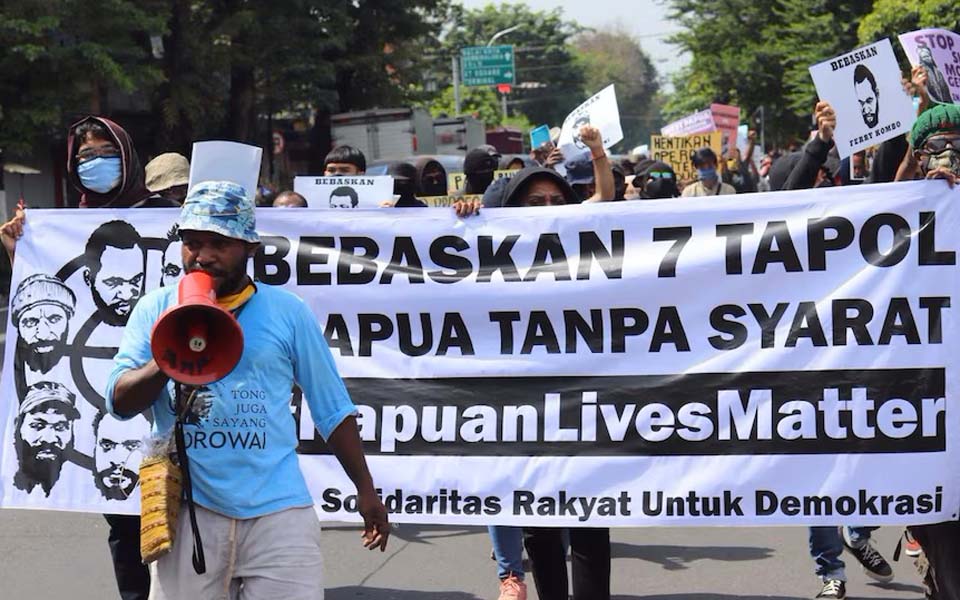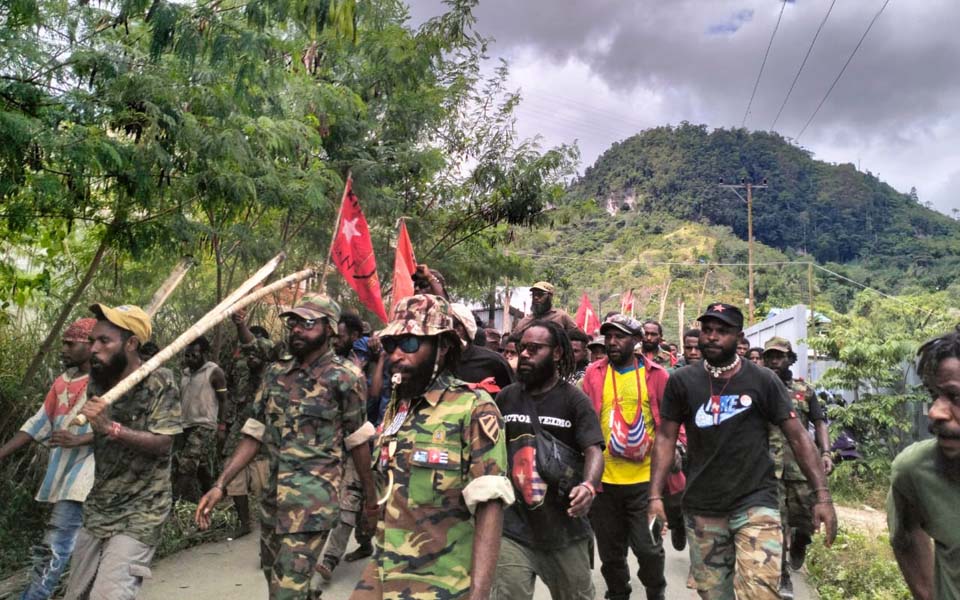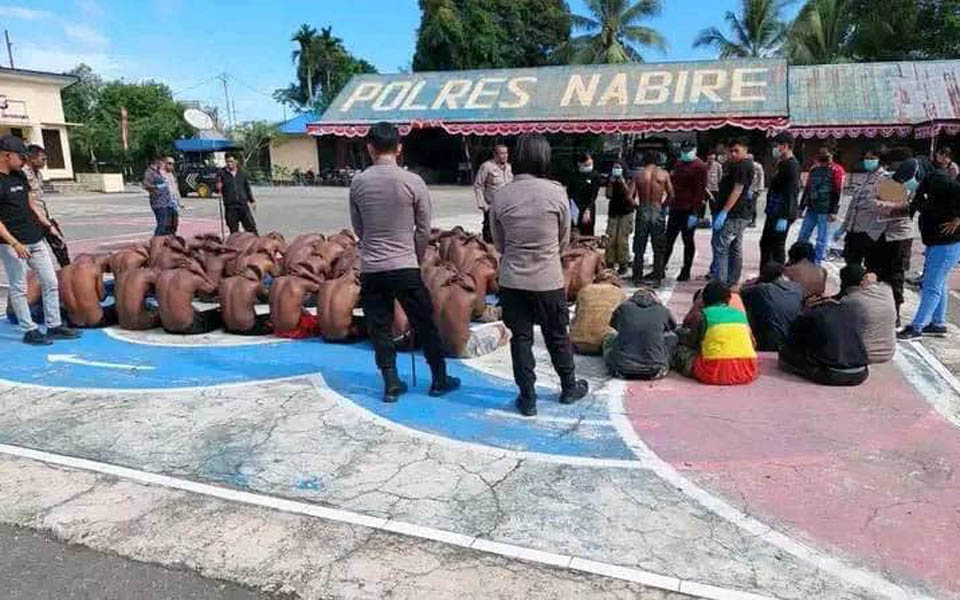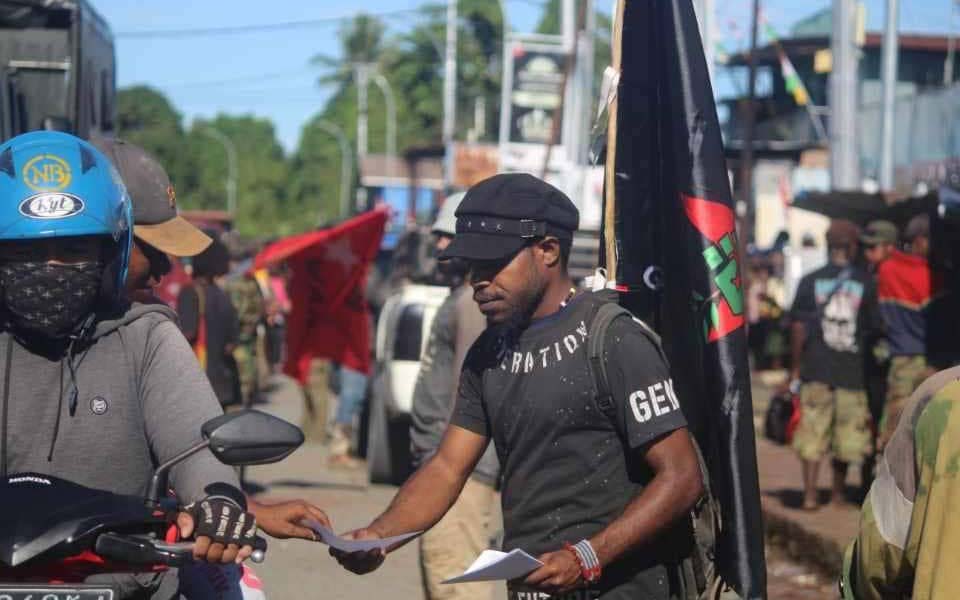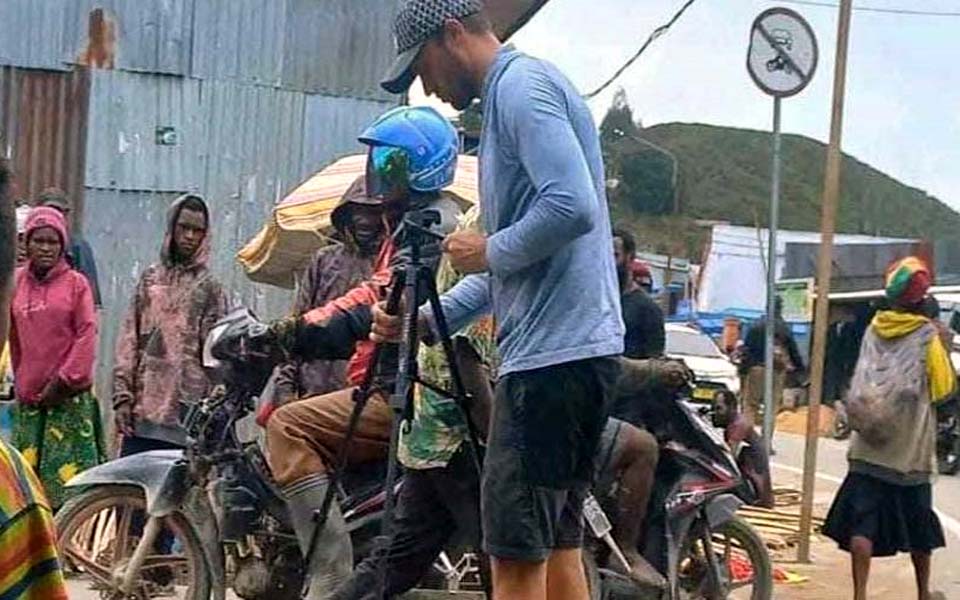Racism by the ruling class through the security forces and reactionary civil militia groups against the Papuan people has triggered a fight back. The siege and attack on the Papuan student dormitory in the Central Java city of Surabaya on August 16 triggered a wave of anti-racist protests in Papua and across Indonesia.
On August 28, the Indonesian People's Front for West Papua (FRI-WP) launched a protest action in front of the State Palace in Central Jakarta during which the Morning Star independence flag was flown.
On Friday August 30 and the following day the Metro Jaya Regional Police made a series of arrests. Pointing guns at residents, police broke down the door and forced their way into the Lani Jaya student dormitory in Depok and arrested Papuan activists Dano Tabuni and Charles Kossay.
Despite the solidarity for those who were arrested and detained by the Metro Jaya Regional Police, the police instead arrested Papuan activists Isay Wenda, Ambrosius Mulait, Mussa and Sei Hilapok. Later in the afternoon in Jakarta the TNI (Indonesian military) and the police arrested three Papuan women from Nduga regency. All of the arrests were carried out without arrest warrants. FRI-WP spokesperson Surya Anta was arrested by police at a shopping mall in Jakarta on the evening of Saturday August 31.
Two of the Papuan students were subsequently released after it was decided they were mistakenly arrested. The other activists meanwhile, Ariana Lokbere, Ambrosius Mulait, Surya Anta, Dano Tabuni, Charles Kossay and Isay Wenda, who were detained at the Mobile Brigade Command Headquarters (Mako Brimob) in Kepala Dua, Depok, West Java, were charged under Articles 106, 110 and 87 of the Criminal Code (KUHP) on makar (treason, subversion, rebellion).
Four out of the five prisoners held at the Mako Brimob became ill. According to Pastor Suarbudaya Rahadian, one of the members of the advocacy team assisting the six political prisoners, Surya Anta suffered an infected right ear which resulted in him becoming gravely ill with a high fever and difficulties eating. Anta was only examined by a general practitioner but was not given intensive treatment. And it was only after the media got wind of his condition that the police provided special medical treatment.
Meanwhile the health of other political prisoners also deteriorated with Tabuni suffering from a large lump on his chest. Other detainees also became ill including Mulait who suffered tooth problems and Wenda who had stomach problems.
Prior to falling ill, Anta was detained in an isolation cell at the Mako Brimob before being transferred to Salemba prison in December. Reportedly he was placed in a room with no windows and a small ventilator. All day long the room was bombarded by nationalist songs. This was the torture method employed by the CIA to put psychological press on their prisoners.
In addition to this, they had teargas fired at them when they were being visited by family members. Police claimed that the incident was unintentional.
Based on procedural errors during the arrests, raids, seizures and their declaration as suspects, Anta and his colleagues submitted a pre-trial suit with the South Jakarta District Court.
The first pretrial hearing was postponed because the defendants, namely the Metro Jaya Regional Police failed to turn up for reasons that were unclear. They also failed to appear during the second hearing on Monday November 25. The two week delay in the hearings by the sole judge hearing the case was rejected by the plaintiff's lawyers on the grounds that the Metro Jaya police were in the same area as the South Jakarta District Court. Both the sole judge as well as the defendant attempted to prolong the pre-trial process and ignored the rights of the political prisoners.
The pre-trial hearings were resumed on Tuesday December 3, Wednesday December 4 and Friday December 6 until a verdict was handed down on Tuesday December 10. The sole judge in the case however rejected the pre-trail suit.
Yet looking at the chronology of events, the arrests of the five Papuan activists at the Lani Jaya student dormitory in Depok was not in accordance with the legal stipulations in the Criminal Procedural Code (KUHAP).
During the arrests, more than 50 plain-clothed police officers forced their way into the dormitory. They did not show any identification, used violence to gain entry and pointed pistols at the residents. Several dormitory residents, namely Andius, Akim, Aseir, Michael and Etias were throttled by police.
In addition to this, the police did not provide arrest warrants as required by law and only read them out then made the arrests directly. The raid also violated the residents' human rights. Police did not show them a warrant for the raid and the arrests and raids did not involve witnesses from the neighborhood association (RT) and the community unit (RW).
Irregularities also occurred when the six activists were declared suspects (charged). This could be seen from the lack of witness testimonies and the case presentation. Yet according to the regulations on investigations, the declaration of suspects must go through a process of summoning the person who reported the case to police, an examination of witnesses, a case presentation and at least two items of preliminary evidence. This however does not seem to have been the case for the six activists. Less than 24 hours after the August 28 action, they were arrested and declared suspects.
The judge hearing the pre-trail suit however did not see the substance of this. The judge just ruled that the pre-trial appeal was flawed formally because the subject of the pre-trail suit was the Indonesian police as an institution which have the authority to use their capacity or position. The judge also stated that the president cannot be held responsible in the case. The judge totally failed to look at the facts of the hearing such as the process of the arrests, the raids, the seizures and the declaration of suspects which was flawed procedurally and violated human rights.
A preliminary hearing was held on Monday December 16 at the Central Jakarta District Court. The lawyers representing the six defendants protested because the defendants had yet to receive a copy of the indictment. This showed blatant disrespect for the rights of the defendants and ignored Article 143 of the KUHAP which states that for the sake of justice, defendants must be afforded all their rights including knowing and understanding the charges against them.
Moreover in looking at this case, the six political prisoners were indicted under very serious charges. The six are alleged to violated Articles 106 and 110 of the Criminal Code (KUHP) on makar which carries a maximum sentence of life imprisonment.
Meanwhile the hearing to hear the reading out of the demurrer (objection to the charges) by the defendants on January 6 was postponed by the judges because Dano Tabuni and Ambrosius Mulait for koteka (traditional penis gourds inside the courtroom. The wearing of a koteka was symbolic of their identity as Papuans.
Then at the hearing on January 20, which should have begun at 1 pm, was postponed for several hours because Tabuni and Mulait insisted on wearing a koteka in court.
Throughout the hearings, the six activists repeatedly sung traditional songs of the Papuan people and gave political speeches on the oppression of the Papuan people in particular and the emasculation of reformasi – the reform process that began in 1998 – in general.
The arrest of the six activists generated solidarity and actions were initiated by the FRI-WP as well as other groups in various cities around the country. It was not uncommon for these actions to be met with repression by the security forces working alongside reactionary groups.
In Ternate, North Maluku, four students from the Khairun University (Unkhair) – Fahrul Abdul (faculty of agriculture), Arbi. M. Nur (faculty of education and teacher training) and Fahyudi Marsaoly (technical faculty) – were expelled by the rectorate after being involved in a peaceful protest action "Commemorating 58 Years since the Declaration of West Papuan Independence".
In Lampung, South Sumatra, a student from the Malahayati University law faculty, Kristina Tia Ayu, was not allowed to take part in the end of semester exam. This occurred after they took part in an action on the issue of "Freedom of Expression is a Human Right, End the Criminalisation and Release Papuan Pro-Independence Activists Unconditionally" on Wednesday September 18 in front of the Bandar Lampung University. This was the second act of intimidation against Kristin who had earlier been threatened with having her scholarship withdrawn.
And it was not just in Lampung. A Kamisan (Thursday Action) in Makassar, South Sulawesi, was attacked by a reactionary group on January 2 at the Makassar City Boulevard. During the action they demanded that the government immediately and unconditionally release Papuan political prisoners and try the perpetrators of racism and provide democratic space in Papua. Before the action even began the protesters were attacked by a reactionary group shouting "We the KNRI [the Unitary State of the Republic of Indonesia] will break up your demonstration".
Meanwhile Buchtar Tabuni (West Papua National Committee (KNPB) deputy chairperson), Agus Kossay (KNPB chairperson), Fery Kombo (a former Cendrawasih University Student Executive Council (BEM) chairperson), Alexander Gobay (Jayapura University of Science and Technology BEM chairperson), Steven Itlay (KNPB Mimika chairperson), Hengki Hilapok and Irwanus Uropmabin, who were arrested in Papua and West Papua and have now been transferred to Balikpapan in East Kalimantan, have fallen ill during detention.
Tabuni has a wet cough and stomach problems. Steven Itlay also has stomach problems, difficulty breathing and wet cough. Alexander Gobay is experiencing stomach problems and difficulties breathing. Ferry Kombo also has a wet cough, is weak and has stomach problems. Hengky Hilapok meanwhile is feeling weak all over, his stomach aches, has a headache and tooth problems. Agus Kosay and Irwanus Uropmabin also feel week, have stomach aches and wet coughs. The transfer of the seven tapols from Jayapura to Balikpapan was done secretly and the police only informed their families after they had been transferred.
The actions in Papua and West Papua spread on August 19, 2019. Thousands of people filled the streets in different cities besieging Indonesian government centres. At the Papuan governor's office, the KNPB thorough its spokesperson Victor Yeimo said that the ones entitled to determine their future of the Papuan nation are the Papuan people themselves.
Protest actions took place in Manokwari, Jayapura, Sorong, Timika, Mimika, Fakfak, Merauke, Nabirem Yahukimo, Deiyai, Paniyai, Wamenam Dogiyai and Yahukimo. The protesters' demands ranged from demanding that President Joko "Jokowi" Widodo apologise, the withdrawal of the military from the land of Papua to demanding the democratic right of self-determination for the West Papua nation. The Morning Star flag was flown during the actions.
And it did not end there. Efforts to gag democracy by the regime were also done by criminalising Veronica Koman, a human rights activist and lawyer for the Papua Student Alliance (AMP). Koman has been accused of spreading fake news and incitement through her Twitter account by posting information on what has been happening in Papua since the racist incident in Surabaya. The human rights violations by the regime were complete after the government blocked her social media account, froze her bank accounts and asked the director general of immigration to revoke her passport. Since then Koman has been on the Indonesian police's wanted list simply for disseminating information about the situation in Papua and calling for solidarity in the fight against racism against the Papuan people.
According to data by the British-based human rights organisation Tapol and the Papuans Behind Bars campaign, there are a total of 57 political prisoners were arrested and detained between August 30 and December 1, 2019. This includes the Jakarta six in Jakarta, the seven in Balikpapan, four people in Manokwari, one person in Jayapura, one person in Timika, 23 people in Fakfak and 15 people in Sorong.
Demonstrations and mass mobilisation are a method to fight for the interests of the working class and the ordinary people. To confront the bourgeois class which exploits the working class. It is in order to maintain this exploitation that the bourgeois class arrests and imprisons those who fight back and, in short, stifle democracy.
Democracy cannot be separated from the struggle by the working class and ordinary people to obtain prosperity, peace and equality. Because of this therefore democracy must be fought for. Without democracy there will not be civil and political rights and the working class and the ordinary people will be further impoverished.
If the Jakarta six are declared guilty, then the stifling of democracy will become stronger, not just in Papua but also in Indonesia. An anti-democratic approach will become normalised. Furthermore, it will legitimise the full stifling of democracy with regard to the freedom to speak out about the oppression of the Papuan people, strengthen the legitimacy of the military in Papua and the continuation of human rights violations.
A victory in this case will be a blow against repress and the legitimacy of President Widodo and human rights violators. It will strengthen the Papuan people's fight for self-determination and the broader struggle for democracy in Indonesia.
This victory can only be achieved on the basis of solidarity by the entire working class and oppressed people. On the one hand, only the working class and oppressed people have an interest in winning their democratic rights. On the other hand, such a victory will open greater and broader democratic space for the working class and the oppressed people. Greater democracy for the working class and the oppressed people means getting closer to socialism. The working class and the oppressed people must abandon narrow nationalistic sentiments which in the end only split and divide the solidarity struggle of the oppressed people throughout the world.
[Translated by James Balowski. The original title of the article was "Bebaskan Tahanan Politik, Sekarang Juga! Hak Menentukan Nasib Sendiri Untuk Papua! Demokrasi Untuk Indonesia!".]
Source: Arah Juang print edition Number 77, November 2019






